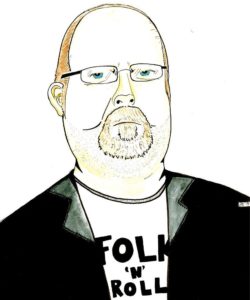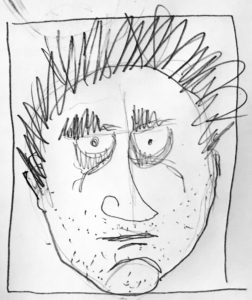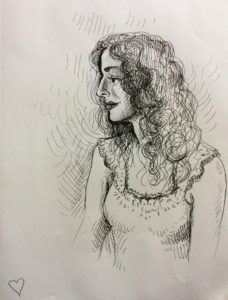About Ethnographix
Ethnographix explores cartooning as a medium for ethnographic representation, the role culture serves in shaping cartooning practice, comics as sources of ethnographic data, and the ethnographic study of comics and cartooning.
Contributors

Picture credit: Alison Uhma (@alisonuhma)
Ian Brodie is the Associate Professor of Folklore at Cape Breton University, researching the intersection of folk and popular culture. His books include A Vulgar Art: A New Approach to Stand-up Comedy (University Press of Mississippi, 2014) and Old Trout Funnies: The Comic Origins of the Cape Breton Liberation Army (Cape Breton University Press, 2015). He has served as president of the Folklore Studies Association of Canada and is currently co-editor of Contemporary Legend: The Journal of the International Society for Contemporary Legend Research.

Andy Kolovos is a Folklorist (PhD Indiana University) and Archivist (MLS Indiana University) with a life-long love of comic books. He has an abiding interest in the use of folklore by cartoonists (for example Mike Mignola’s Hellboy, Bill Willingham’s Fables, and the work of Dan Clowes and Evan Dorkin), and profound love for the formulaic aspects of genre-based storytelling in superhero, horror, romance, and crime comics.
The work of comics journalists such as Joe Sacco and Emmanuel Guibert opened his eyes to the use of comics as a way of sharing the contemporary experiences of others–and by extension the potential of cartooning as a powerful means of ethnographic representation.
He was one of the coordinators of the ethnographically-informed, collaborative cartooning project, El viaje mas caro / The Most Costly Journey, an effort that paired cartoonists and Latin American migrant farm workers on Vermont dairy farms with the goal of creating graphic tools for health and wellness outreach.
In real life he works at the Vermont Folklife Center.

Hilary Morgan Leathem is a writer, folklorist, and anthropologist of heritage (PhD candidate, University of Chicago). Drawing was her favorite mode of expression before writing, and she is excited by anthropology and folklore’s interest in embracing drawing as both a method and way to better engage with the public. She believes graphic ethnography and comic-making helps ethnographers effectively highlight important narrative threads, as well as opening up questions of ethics, representation, and re-presentation.
Her favorite graphic novels include Marjane Satrapi’s Persepolis, Guy Delisle’s Burma Chronicles, and Eduardo “Rius” del Rio García’s Oaxaca de Rius. Lynda Barry occupies a special place in her heart with her graphic “textbook” What It Is.
Hilary recently returned from a year of research in Oaxaca, Mexico as a Fulbright-Hays scholar. She has worked in Oaxaca since 2008, first as an archaeologist, and drew a short comic about her early fieldwork for the Centre for Imaginative Ethnography called Fragmenting Pasts and Futures: Wandering Oaxaca and Beyond.
Aside from drawing, she actively experiments with film and genre fiction.

Illustration by Frances Cannon.
Jessie Mazar has recently been introduced to the medium of comic books as a form of story telling and there is no turning back. It started when she began taking notes and turning in assignments in the graphic novel form in 2011 while traveling and studying. Upon returning to the U.S., her dear friend, Scout, introduced her to graphic memoir and graphic narrative through the works of Art Spiegelman (Maus), Marjane Satrapi (Persepolis) and Alison Bechdel (Fun Home).
Jessie received an M.S. in food systems at the University of Vermont (October 2016). As part of her research she collaborated on an applied comics project, El Viaje Más Caro/The Most Costly Journey. This project works with Latino/a migrant farmworkers living and working in the Vermont to share their stories and transform them into comics, which are then shared with other farmworkers as a therapeutic tool.
In the spring semester she will be working for the International Honors Program and will travel to California, Tanzania, India, and Italy. She is particularly interested in comics as tool for advocacy and social justice, as well as ethnographic and narrative comics.
